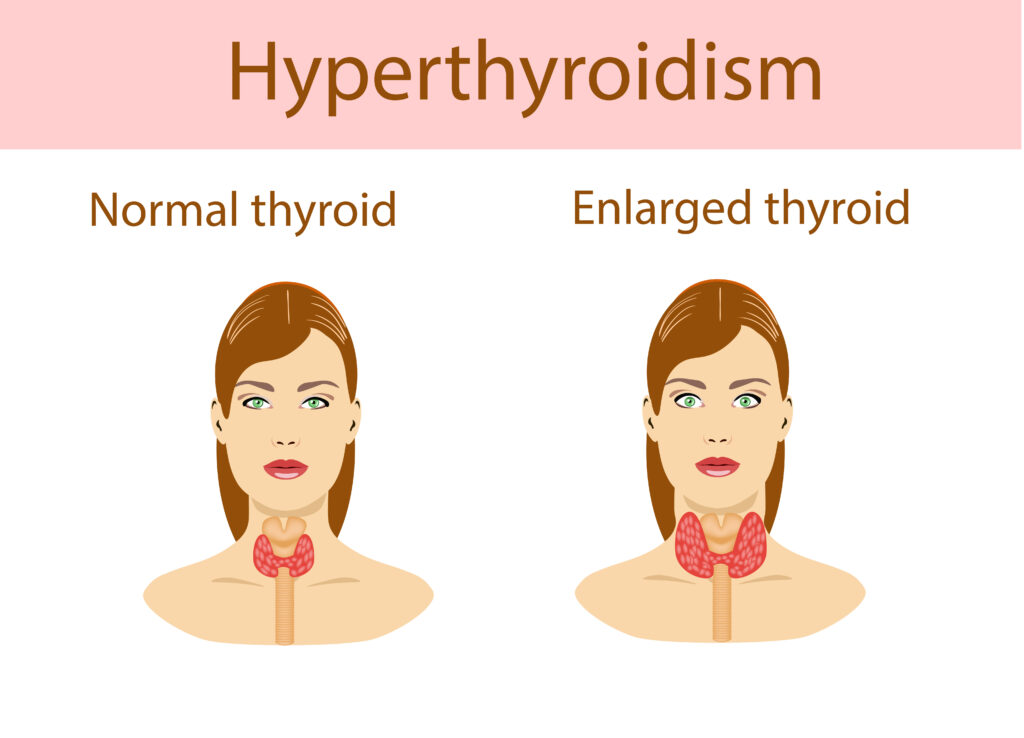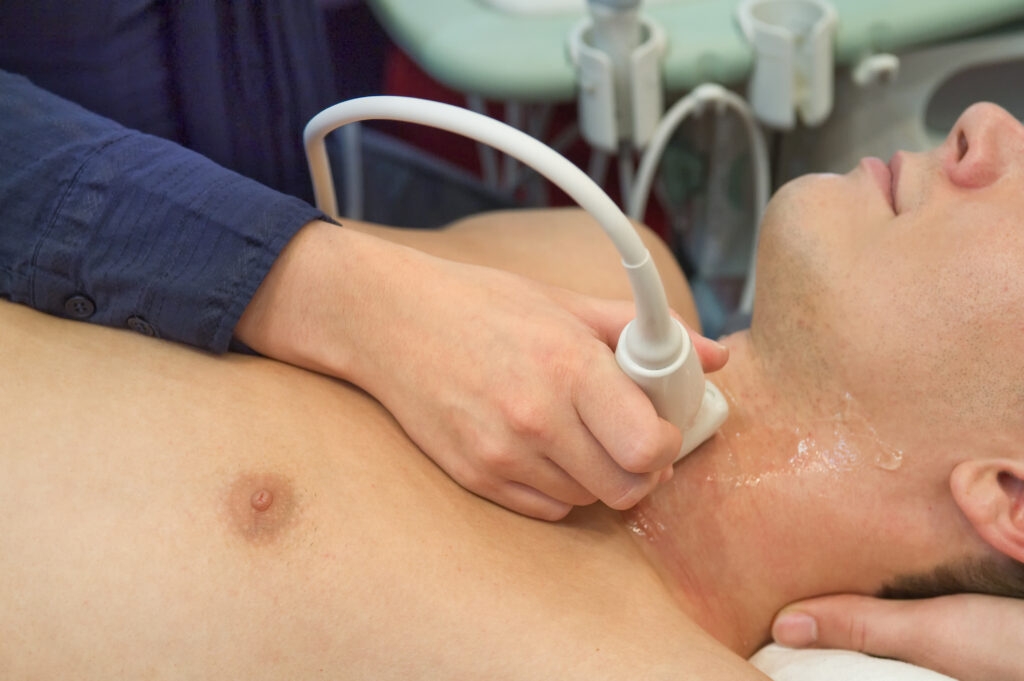Hyperthyroidism is a common condition that occurs when the thyroid gland produces an excessive amount of thyroid hormones. These hormones, produced by gland follicular cells, regulate the body’s metabolism, heart rate, and other functions.

The primary condition seen with hyperthyroidism is Grave’s Disease. This autoimmune disorder causes the thyroid gland to produce too much thyroid hormone, leading to symptoms such as rapid heartbeat, sweating, weight loss, and nervousness.
Grave’s disease is caused by the production of antibodies that stimulate the thyroid gland to produce too much hormone. This overproduction of thyroid hormone results in hyperthyroidism. The exact cause of this autoimmune disorder is unknown, but it is believed to be related to genetics and environmental factors.
Other causes of hyperthyroidism include toxic multinodular goiter, in which thyroid nodules secrete too much hormone, and thyroiditis, which is an inflammation of the thyroid gland. Yet, Grave’s Disease is the most common cause of hyperthyroidism.
Symptoms and Diagnosis Of Hyperthyroidism
Diagnosis of hyperthyroidism requires a high index of suspicion in many cases due to some of the similarities that can be seen in other conditions. Yet, some aspects of the disease can be easily identified and will help with the diagnosis.
The main signs and symptoms of hyperthyroidism include bone weakness, vision impairment, skin irritation and swelling, irregular heartbeat, restlessness, inability to concentrate, muscle weakness, breast development in men, dizziness, or shortness of breath, hair loss, and nausea.
There are several reliable and effective tests used to diagnose overactive thyroid conditions accurately. These tests include:
- Thyroid Function Tests: Thyroid function tests are a group of tests that measure the levels of thyroid hormones and thyroid-stimulating hormone (TSH) in the blood. High levels of thyroid hormones and low levels of TSH indicate hyperthyroidism. Common thyroid function tests include the TSH, total T4, and free T3 tests.
- Radioactive Iodine Uptake Test: The radioactive iodine uptake test is a test that measures the amount of radioactive iodine that is absorbed by the thyroid gland. During this test, a small amount of radioactive iodine is ingested, and the amount of radiation absorbed by the thyroid gland is measured using a special camera. This test can help determine the cause of hyperthyroidism and the size of the thyroid gland.
- Ultrasound or CT Scan: An ultrasound or CT scan can provide a visual image of the thyroid gland and help determine the size of the gland. This can identify abnormalities of the gland and help guide treatment decisions.

- Thyroid Stimulating Hormone Receptor Antibody Test: The thyroid-stimulating hormone receptor antibody test is a blood test that measures the levels of antibodies that stimulate the thyroid gland. High levels of these antibodies are present in people with Grave’s disease, the most common cause of hyperthyroidism.
Common Treatments for Hyperthyroidism
The goal of treating hyperthyroidism is to restore the thyroid to optimal function, balance any hormonal imbalances, and relieve symptoms of the condition. Your healthcare provider will determine the most appropriate treatment for your case based on the severity and stage of the condition.
The following is a summarization of the most common treatments for hyperthyroidism:
Medications and Prescription Drugs
There are several medications that are commonly used to treat hyperthyroidism, two of the most common being anti-thyroid medication and beta-blockers.
Anti-thyroid medication is a type of drug that reduces the amount of thyroid hormones in the body. This medication works by inhibiting the activity of an enzyme that is responsible for producing thyroid hormones. Commonly used anti-thyroid medications include methimazole and propylthiouracil.
Beta-blockers are medications used to manage symptoms associated with hyperthyroidism, such as rapid heartbeat, tremors, and anxiety. Beta-blockers work by blocking the effects of epinephrine, which is responsible for increasing heart rate and blood pressure. Commonly used beta-blockers include propranolol and atenolol.
Surgery

Surgery is a more serious and invasive treatment option for people with hyperthyroidism who are unable to take medication or who have failed other treatments.
The procedure involves removing all or part of the thyroid gland. Surgery is typically performed under general anesthesia and is considered a safe treatment when medically necessary.
Radioactive Iodine Treatment
Finally, radioactive iodine treatment is another option for treating hyperthyroidism. This treatment involves taking a small dose of radioactive iodine, which is then absorbed by the thyroid gland.
The radiation from the iodine helps to shrink the gland and reduce the production of thyroid hormones. This treatment is usually performed on an outpatient basis and does not require any surgical incisions.
When determining specific treatment for hyperthyroidism, it’s important to understand that the best treatment option will depend on the individual’s specific circumstances, including their age, overall health, and the cause.
Final Thoughts
Hyperthyroidism is a condition causing an overproduction of thyroid hormones resulting in several signs and symptoms. However, the condition can be managed well with timely and effective treatment.
Early diagnosis is required to ensure effective and timely treatment, and this can be accomplished quite readily through various testing.
